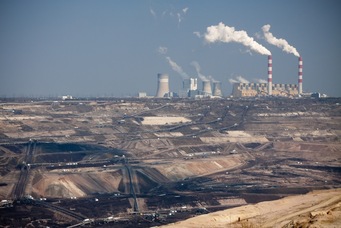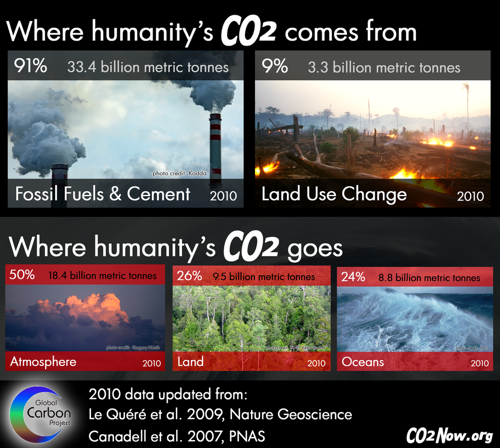Fossil Fuels
|
Navigation
According to a study done by the National Academy of Sciences (see also), burning fossil fuels costs the United States about $120 billion a year in health costs, mostly due to the tens of thousands of premature deaths from air pollution. The academy did not include damages from global warming, which is mainly caused by the burning of fossil fuels, nor did the study measure damage from burning oil for trains, ships and planes or include the environmental damage from coal mining or water pollution. Read the New York Times Article |
 Surface Coal Mining © Nivellen77, Dreamstime.com | Click to enlarge
Fossil fuels, including oil, coal and natural gas, are currently the world's primary energy source and account for more than two-thirds of U.S. electricity generation. Formed from organic material and natural processes over millions of years, fossil fuels are finite resources that have fueled U.S. and global economic development over the past century, however, these depleting, increasingly expensive resources have also fueled immeasurable destruction upon the planet and its inhabitants and have corrupted politics and democracy. Our global fossil fuel infrastructure and dependence has led to a vast, interconnected web of issues by undermining the stability of Earth's climate, harming the health of countless people around the world, polluting and destroying marine and terrestrial habitats, corrupting politics with dirty energy money, leading to energy insecurity, debt and poverty, blocking a clean energy transition, using far more water to generate electricity (view report) , which is set to double by 2035, than clean energy technologies like solar and wind, and increasing human rights abuses, war and national security concerns. These true energy costs are not included in consumer utility or gas bills, nor are they paid for by the fossil fuel companies that produce or sell the energy. They are simply and traditionally considered external to the energy pricing system, which masks the true costs of fossil fuels by referring to the effects of their byproducts as 'negative externalities' and allowing society as a whole to pay for them with our health, our polluted environment and the long-term degradation of our economy. The International Energy Agency stated in it's 2012 World Energy Outlook that “No more than one-third of proven reserves of fossil fuels can be consumed prior to 2050 if the world is to achieve the 2 °C goal.” (see also) In other words, over two-thirds of today’s proven reserves of fossil fuels need to still be in the ground in 2050 in order to stay below the internationally recognized limit of 2 °C average global warming and prevent catastrophic and irreversible (see also) levels of climate change. With tough limits on the burning of fossil fuels, we could avoid 20% - 65% of the damaging effects of climate change by 2100. All energy development activities will have some type of environmental, societal, health or economic impact, however, we should pursue the energy options that are the least damaging to human health, most promising for long-term economic viability and least threatening to Earth's climatic stability, finite resources and natural balance. Learn more.
"Today, we are on the verge of a new era, the “Age of Ecological Scarcity”. For the first time in history, fossil fuel energy and raw material use, environmental degradation and pollution may be occurring on such an unprecedented scale that the resulting consequences in terms of global warming, ecological scarcity and energy insecurity are generating worldwide impacts. If humankind is to succeed in overcoming these global problems, we need to find the next “new frontiers” of natural resources and adapt economic development accordingly. This will require developing low-carbon sources of energy, processes of production and technological innovation that require less environmental degradation and pollution. It will also mean instigating institutional changes, creating global carbon and environmental markets, and implementing new policies to foster a new era of “sustainable” economic development." ~The World Financial Review |
|
Oil Oil, which formed from ancient plants and animals deposited some 500 million years ago, is the world's primary fuel source for transportation and has been a defining force of our times. Oil created economies, but also condemned them; shaped political boundaries, but also bought them; won wars, but also created them; remade the urban environment, but also polluted it; released a low price tag, but "externalized" its true costs; created jobs, but abused rights and degraded health. Everything good that has come from oil has come at a price far higher than what you see plastered on billboards over gas stations - a price that nature and society shouldn't have to endure so heavily and an addiction that unless triumphed, will cause climate catastrophe and all of the subsequent ills that follow. |
Coal Coal, which was formed from prehistoric vegetation that accumulated about 300 million years ago, is an abundant and superficially cheap fossil fuel compared to the soaring prices of oil and natural gas, and accounts for almost 40% of total worldwide power generation. Coal is also the biggest source of man-made CO2 emissions, which makes coal the single greatest threat to the stability of our climate, and is responsible for immeasurable impacts on human health through the emissions of mercury, arsenic, dioxin, acid gases, such as hydrogen chloride, and other dangerous pollutants, and the environment in the form of particulate emissions, ground level ozone, smog, acid rain, coal ash waste, mountaintop removal and global warming. |
Natural Gas Fracking, also known as hydraulic fracturing or industrial gas drilling, is a process used in 90% of oil and gas wells which injects tens of millions of gallons of water, chemically treated sand, and toxic chemicals, which have not been fully tested or disclosed to the public, deep into the ground at extremely high pressures to break apart dense shale rock, releasing the hydrocarbons, such as gas and oil, contained inside. This mixture, known as "frack fluid," creates "fractures" in the shale which allows the gas to seep out. From well site preparation, to drilling and production, to the disposal of wastes, this dangerous, unconventional method of obtaining oil and gas is a shortsighted energy strategy that is contaminating drinking water and soils with toxic chemicals, polluting the air, jeopardizing our health, devastating landscapes, causing earthquakes and contributing to climate change and extreme weather. |
|
Your browser does not support viewing this document. Click here to download the document.
|
via chartsbin.com
|
|
|
Last Revised: 11/20/13
Commenting Rules |






